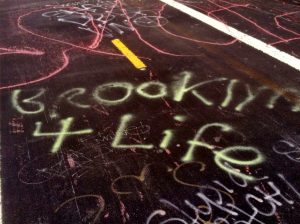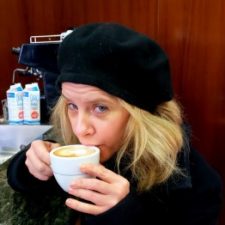For this Pedagogy Profile, we heard from Jennifer Sears, an Assistant Professor in the English Department and a Faculty Leader for the First Year Learning Communities program.
When did you begin working at City Tech?
I became a full-time faculty member in fall 2014. Prior to that appointment, I was a substitute Lecturer and adjunct professor in the English Department and taught in the First Year Summer Programs.
Describe your experience joining the OpenLab and when/how you began actively using the platform to support your pedagogy. Why did you decide to start using the OpenLab?
I first used the OpenLab in March 2014 when I created Words Have Lives, a tutoring site for developmental writing students. Lauri Aguirre, Director of First Year Programs, asked me to design the site as a “commons” with the intention that future Developmental Writing tutors and students might use and develop the materials even further. I remember I had fun figuring out that site! I’d done some blogging already, so some of the functions and the navigation tools were familiar. I liked the title I chose–Words Have Lives–and wanted it to have a “Brooklyn” theme. Some of the photographs are from my Williamsburg neighborhood and a walk over the Williamsburg Bridge on a memorably sunny day.  For that first project, the students were primarily recipients of emails with links to resources and also reminders for upcoming tests.
For that first project, the students were primarily recipients of emails with links to resources and also reminders for upcoming tests.
My next project was for the First Year Summer Program (FYSP) a few months later, in the summer semesters of 2014. I co-wrote a Common Reading Project with a fellow English professor, Robert Ostrom, focusing on Malcolm Gladwell’s book Outliers. I wanted to add an OpenLab site to make the project more visibly appealing for instructors to take into their classrooms. With posts on the OpenLab, they could quickly find online resources about Malcolm Gladwell including video interviews and articles.
The reason it worked for the FYSP Common Reading project was because we had multiple faculty, primarily adjunct instructors working at different times and working in different locations. Building a sense of teaching within a community is difficult when instructors don’t have face to face contact with each other, and the OpenLab facilitates this with more visual impact than sharing files on Google Drive or Blackboard. Though there are other ways to share materials among faculty, what was immediately clear was the visual advantage of using the Open Lab.
The challenge of using the OpenLab in 2014 was an obvious one: most faculty weren’t OpenLab yet, and so we had to make everything available in multiple formats and try to help people learn how to log in. But this has changed dramatically in the past five years.
Can you describe the ways you have integrated the OpenLab into your pedagogical practices?
The first course I integrated with OpenLab was an upper level Professional Writing course. I had students create blog posts to write about their professional interests and to think about the professional audience they were targeting. They created several interesting projects. Two projects that come to mind are “Pimp My Dog,” a student’s project about dog grooming. Another I remember was created by a student from California who wrote a site on surfing and the identification of different types of waves. I still saw the site as a blogging platform, and this is what I used it to teach.
In the First Year Learning Communities (FYLC), we use the OpenLab. For students, we have a “My Stories” project for first semester students describing their experiences at the college. The peer leaders, upper level students, in this program also interact with first semester students on the OpenLab. This is one of the powerful possibilities, I think, that the platform facilitates, students meeting students they wouldn’t otherwise meet.
As an instructor in First Year Learning Communities, the linked courses we teach are more easy to link on the sites. One of the FYLC cohorts that integrated the OpenLab most effectively was created with psychology professor Barbara Chutroo. We developed a class that considered the rising rates of depression and stress during the first semester of college and ways to deal with potential stressors. We used the OpenLab in a couple of ways. One was that they all uploaded their student profile and talked about how they came to City Tech. One of the students, Karan Soekhoe, a photographer, uploaded a photo and talked about how beautiful the area was.  Other students uploaded personal images. It was through these courses that I started considering the OpenLab as a place for students to actively contribute.
Other students uploaded personal images. It was through these courses that I started considering the OpenLab as a place for students to actively contribute.
I’ve been active in OER development in a variety of ways. I did the training for OERs and created the “Brain on the Page” OER course for the combination 92W/ENG 1101 course. I then worked as a co-organizer for four English department ENG 1101 courses that were under the OER initiative. Having been part of those efforts, I now use primarily no-cost textbooks and host most of the materials on the OpenLab. What I like about these resources in addition to the fact that they are accessible to students, is that they allow me to easily refresh my own teaching and pedagogical materials every semester.
How has the OpenLab transformed or expanded your pedagogy, and the pedagogical values you’re able to realize in your courses and educational practice?
OpenLab has expanded my pedagogy in a couple of ways. I’ve incorporated a wider range of materials with an emphasis on current materials. I find I’m exploring more ways to get students working online and interacting with other students. I’ve had to rethink what online writing is as a genre and consider how to approach it. This is an increasingly important part of our students’ professional lives.
In 2014, students floundered and often needed help to get started. In 2019, many students need little assistance to get started. More first semester students are posting and uploading materials with relative ease. This shows change in our students and in the continuing development of the OpenLab. I’m still learning about widgets and techniques to make this easier for students and at the same time, they are getting more and more fluent before they get here.





One thought on “Pedagogy Profile: Jennifer Sears”